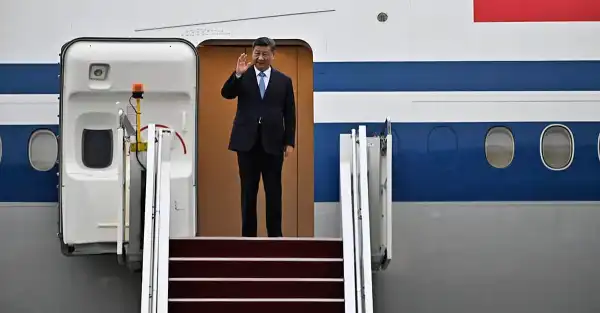
Chinese President Xi Jinping is promoting free trade during his visit to Southeast Asia this week, portraying China as a source of “stability and confidence.”
On Monday, he was greeted with pomp and ceremony in Hanoi by Vietnamese President Luong Cuong.
He arrived in Kuala Lumpur, the capital of Malaysia, on Tuesday for a three-day visit and will end his tour with a stop in Cambodia.
In Hanoi, Mr Xi met with Vietnamese Communist Party General Secretary To Lam, during which he said the two countries had “brought valuable stability and confidence to the world” in a “turbulent world”.
He also paid tribute to the mausoleum of Ho Chi Minh, the founder of the Vietnamese Communist Party.

“As beneficiaries of economic globalization, both China and Vietnam should strengthen strategic resolve, jointly oppose unilateral acts of bullying, uphold the global free trade system and maintain the stability of global industrial and supply chains,” he added, according to a statement from China’s Foreign Ministry.
China and Vietnam have signed a series of memorandums on supply chain cooperation and a joint railway project, and Mr Xi has also promised to expand access for Vietnamese agricultural exports to China, although few details of the agreements have been released.
US President Donald Trump expressed displeasure at the meeting, which came days after his tariffs upended global markets and left governments around the world stranded.
Commenting on Monday’s meeting, Mr Trump said China and Vietnam were trying to “figure out how we can deceive the United States of America.”
In Malaysia, Mr Xi is expected to discuss a free trade agreement between China and the 10-member Association of Southeast Asian Nations, as Malaysia holds the group’s rotating chairmanship this year.
Mr Xi will meet King Sultan Ibrahim on Wednesday morning and Prime Minister Anwar Ibrahim later in the day.
ASEAN Secretary-General Kao Kim Hoorn told Chinese state media that the deal would eliminate many tariffs between China and the bloc’s members.
“In many cases, we will reduce tariffs to zero and then extend them to all regions,” he said in an interview with CGTN, the state broadcaster’s English-language channel.
Malaysia is hosting several projects under the Belt and Road Initiative, including China’s US$11.2 billion railway project.
China is also the largest trading partner and a major source of foreign direct investment.
Mr Xi’s tour was likely planned before tariff announcements disrupted the global economy.

“From China’s perspective, it’s mainly about maintaining China’s strong and active influence in the region, as Southeast Asia is China’s main trading partner,” said Oh Ei Sun, a senior fellow at the Singapore Institute of International Affairs.
But the timing of the trip and the fact that Vietnam, Malaysia and Cambodia were countries affected by Mr Trump’s tariffs give Beijing an opportunity to forecast how it will act as a “responsible” superpower, one of China’s long-standing positions.
“China has a lot to offer Vietnam and other ASEAN countries in this unstable period,” said Nguyen Thanh Trung, a professor of Vietnamese studies at Fulbright University Vietnam.
“I think China can become a leader.”
Mr Anwar called China a “true friend” during Li Qiang’s visit in June and has visited China three times since taking power in November 2022.
China’s claims to the South China Sea are the subject of dispute with both Vietnam and Malaysia.
Last September, Mr Anwar vowed that Malaysia would not bow to Chinese demands to stop oil and gas exploration in the oil-rich South China Sea as the activities were taking place in the country’s waters.
Sourse: breakingnews.ie